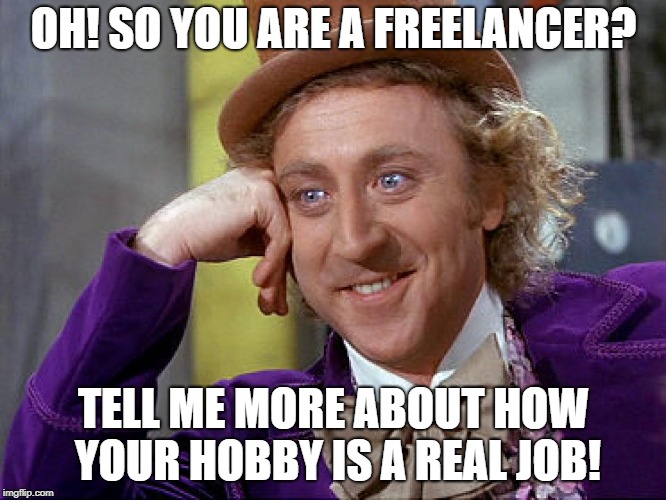How do you respond to the question, “what do you do for a living?” Or the more commonly used version, “where do you work now?”
This question is a seemingly innocuous one on the surface – something to start a conversation, right? But then, it’s also the reason why you feel reluctant to attend family social gatherings, and avoid your high school and college reunions.
“The thing is people ask what you do for a living, so they can calculate the level of respect to give you.”
This may sound pessimistic but just think about it for a minute.
Most people who ask what you do, do not really care about the details of your job. Yes, there are no established research statistics for this assertion, but you will agree with me that what they really want to know is how cushy your job is. They also want to know how much money you’re worth and how far up the ladder of success you are.
So, what’s your answer to, “what do you do now?”
If you are a freelancer, like me, you’re probably going to choke on your answer, because freelancing is not a “real job,” according to your family and friends. You ought to pursue a fancy professional career – a real job, or at the very least, work at a “recognized” 9 to 5 job like your successful friend who is already a junior manager at XYZ company.
I used to respond with “I’m unemployed” or “I’m still searching for a job,” until I did some research and came up with suitable ways to say I’m a freelancer without sounding like a loser.

The Professional Answer To the “What Do You Do for a Living?” Question
Before going on to share my perfect answers for nosy former classmates, here are some tips to help you answer the question what do you do for a living, in a professional setting.
- Don’t just say you’re a freelancer. Instead of saying “I’m a freelancer,” state the service you provide. For instance, “I’m a freelance photographer” or “I’m a freelance website designer.”
- Replace “freelance” with “professional” or “expert.” The word “freelance” is often thought to mean you work for free or cheap, probably because of the “free” in it. So, you could say, “I’m a professional video editor” or “I’m a digital marketing expert.”
- Use a fancy title and then give an example of what you do. For instance, if you are an email writer, you could say you are a communication consultant. If you are a digital marketer in the finance niche, you could say you are a marketing consultant in the finance industry.
- Skip the title and state the value of what you do. For instance, if you are a copywriter, you could say, “I help businesses sell their brand or product using compelling stories.” As a video editor, you could say, “I create videos that help companies promote their brand.”
The Mind Your Business Answer To the “What Do You Do for a Living?” Question.
If you are in the midst of show-off former classmates, who are asking what you do for a living to judge how successful you’ve become, the best way to answer the question is to change the subject. Instead of saying what you do, tell them what you’re passionate about, and then ask what they love doing as well.
If they are really interested in having a conversation, they would respond with what they love doing, and the conversation will go on from there. Otherwise, you’ll probably get a blank stare, and then they would ramble on about their “real job.”
If you would rather not endure the rambling about how awesome and high-paying their job is, here are some pretty cool answers for some freelance jobs that would get them to walk away from you quickly.
- Web Content Writer – I lounge at home all day, reading and writing.
- Graphic Designer – I draw shapes and create images on my computer.
- Ghostwriter – My work is classified, so I can’t really tell you about it.
- Video Animator – I create funny cartoons and doodles on my laptop.
- Copywriter – I use magic words to compel people to buy a product.
- Dropshipper – I sell stuff from other people’s store and don’t deliver.
- Facebook Ads Manager – I create all those ads you click on Facebook.
- Email Marketer – I spam strangers’ email to get them to buy something.
With all of these tips and examples, you should be able to answer the “what do you do for a living question” flawlessly. Do let me know which of them you plan to use, as well as your ideas for answering nosy strangers in the discussion box below.
By the way, there’s a situation I haven’t quite figured out yet. How do you respond to a kid asking you, how come they never see you go to work like other adults?


